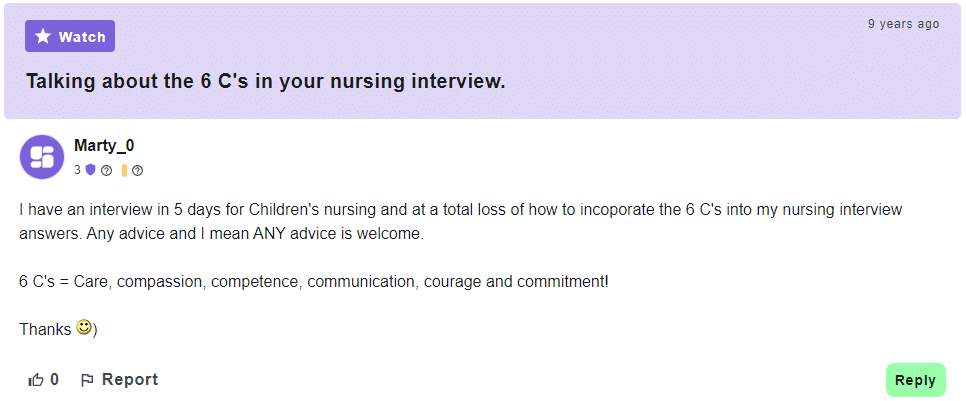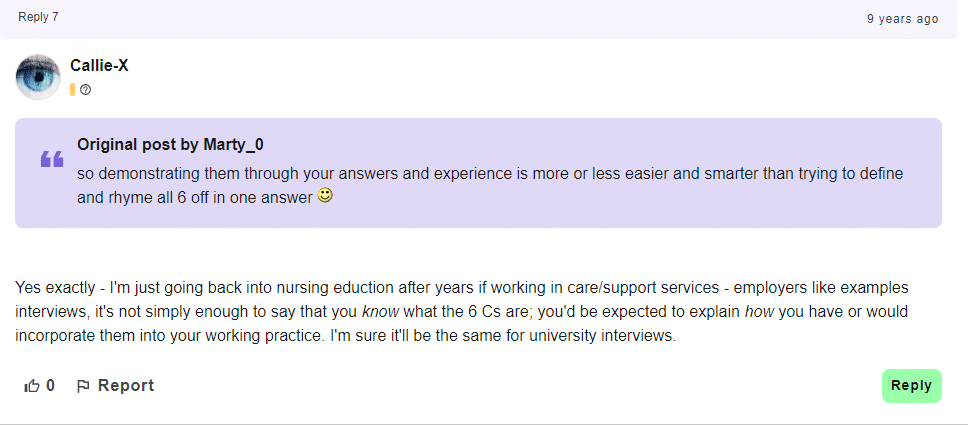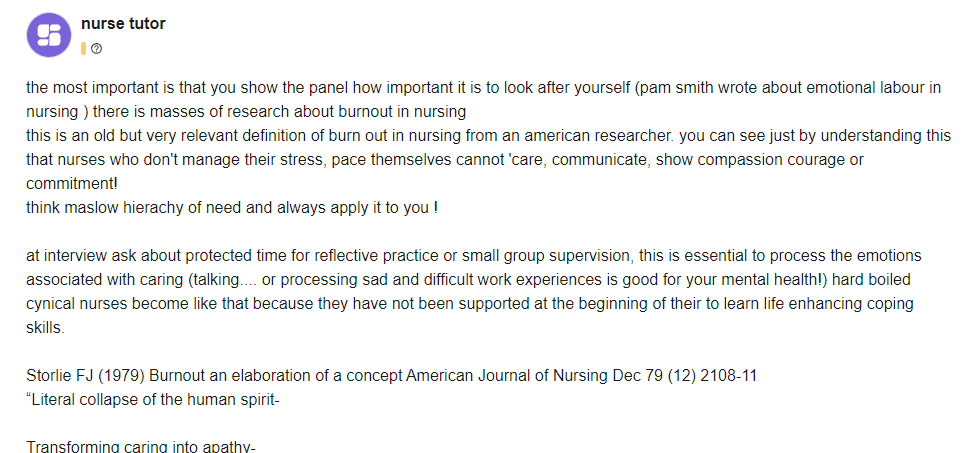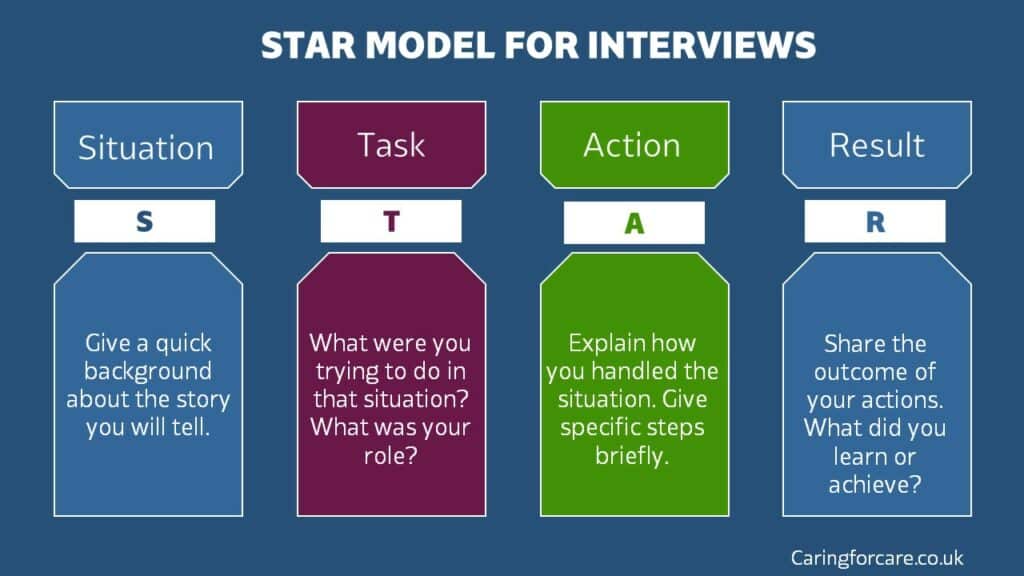Using the 6 Cs for Nursing Interview:

As an experienced nurse who has been through my fair share of NHS interviews, I know how nervous it can be when they start asking you questions about the 6 Cs of nursing.
For those who might not be familiar, the 6 C’s – care, compassion, competence, communication, courage, and commitment – are considered the core values every nurse in the UK’s National Health Service needs to embody.
Interviewers love to ask behavior-based questions about the 6 C’s to understand if you have what it takes to be an excellent nurse.
Since these qualities are so vital, some form of 6 C’s questions will likely come up in any nursing interview you have within the NHS or otherwise.
But there’s no need to panic!
In this post, I’ll explain what each of the 6 C’s entails, provide example interview questions with suggested STAR model answers, and share why the STAR technique can be the key to excelling in your nursing interviews.
I will spin in interview questions you might meet at different Band Levels within the NHS, answer them using the powerful STAR model, and add in some substitute questioning methods for good measure.
Interview Example from Student Room Website
Take a look at this question a student nurse asked on Student Room forum when she was preparing for an interview. This forum provides answers to some questions for nurses and midwifery.

She got some answers which were very helpful even though it may not cover her experience but thus gives her a place to start from.

Callie-X mentioned here that it is important to demonstrate the answers through personal experience. This is a smart way for any interview because employers want to know if you actually qualify for the role.
She got another detailed response from a Nurse tutor. She went further to share deeper aspect anyone should consider when answering an interview question.

This post uses a well accepted model for answering interview question evolving the C’s of nursing.
You can also read our blog post on tips on how to building a career in elderly care which as some questions and answers as well. If you need elder care training, you can speak with our team.
Using the STAR Model for Nursing Interviews

First, What is the STAR Method?
Before we get to sample questions, let me quickly summarize the STAR interview method, as it’s definitely your friend when answering any behavior-based interview questions:
S – Situation – Set the scene by explaining the circumstance or challenge you were facing
T – Task – Describe what your responsibilities were in that situation
A – Action – Explain the specific actions you took to address it
R – Result – Share what outcomes your actions achieved
The STAR method tells the story of how you demonstrated important skills or abilities, allowing the interviewer to weigh how eligible you are.
Using actual examples from your nursing experiences to talk about your skills and potentials is what the STAR model is all about.
Now, let’s look at some common 6 C questions and STAR responses:
Compassion Tell me about a time you showed compassion while caring for a patient.
S: During my last hospital rotation as a student nurse, I was appointed to care for a terminal cancer patient in hospice. The patient was nervous about her health condition and quality of life as death approached.
T: My task was to monitor her IV medications, check her vital signs, and do what I could to comfort her. However, I knew part of caring for her went beyond just her physical needs.
A: I pulled up a chair to sit beside her and asked if she wanted to talk more about her feelings regarding her illness and passing.
We had an open talk about her concerns, hopes, and needs during this difficult time. I provided a listening ear and reassuring words about appreciating each day.
R: The patient said our talks really provided comfort and ease her worries. She was able to relax and embrace the time she had left. My compassionate presence improved her wellbeing.
Courage When have you spoken up about a problem in order to protect patients or improve care?
S: As an agency nurse, I was once assigned to a ward with very low staffing levels for the number of unstable patients.
T: My task was to provide safe care for my set of patients. However, the staff shortages and high patient loads increased risks on the floor.
A: During handoff, I respectfully raised concerns about our staffing ratios to the charge nurse, providing examples of how it was difficult to adequately monitor and care for so many high-acuity patients at once. I explained fears about risks to patients as a result.
R: The charge nurse increased floor staffing over the next few shifts. My speaking up helped improve staff to patient ratios so we could deliver safer care.
As you can see from these examples, the STAR technique allows you to talk about times you actively embodied the 6 C’s on the job using real-life stories and concrete details, helping showcase why you’ll make an excellent nurse.
BUY Now – Build Your Interview Skills – Interview Online Training Skills – CPD Approved
Other Interview Answering Methods
While the STAR tactic is especially effective for behavior-based interview questions like those about the 6 C’s, other helpful models.
Examples are SOARA method (Situation, Obstacle, Action, Result, Application) and Past, Present, Future (examples from your past experience, present capabilities, and future goals).
It is best to stick to one asked during your nursing interview. Importantly, design your answers beforehand.
6 C’s interviews with STAR Method
Look into these as you prepare for your nursing interviews!
Now that you know what to expect with 6 C’s questions and how to tackle them, I hope you feel much less intimidated about your upcoming nursing interviews.
Let me know if you have any other questions! I’m always happy to lend advice from my own experience to help fellow nurses succeed.
Example-1: Band 2-3 Nurse
- Tell me about a time you went above and beyond to make a patient’s day. (Care, Compassion)
- STAR Answer: “During a busy night shift, I noticed an elderly patient feeling lonely and isolated. I took the time to sit with him, listen to his stories, and share a cup of tea. He ended up crying, thanking me for making him feel cared for. It was a small gesture, but it made a big difference.”
Example-2: Band 5 Nurse
- Describe a situation where you had to disagree with a senior colleague about patient care. (Courage, Communication)
- STAR Answer: “While assisting a doctor with a medication change, I noticed a potential interaction with another medication the patient was taking. I respectfully raised my concerns, citing my knowledge of drug interactions. We discussed it calmly, and, the doctor agreed to adjust the medication plan based on my input. It was a delicate situation, but communication and courage ensured the best outcome for the patient.”
Example 3: Band 7 Nurse:
- How do you stay current with the latest growth in your nursing specialization? (Commitment, Competence)
- STAR Answer: “I enjoy and love subjects on critical care, so I actively participate in online forums and conferences for critical care nurses. I also signed up to important medical papers and regularly attend in-house training sessions. I believe constant learning is vital for continuing skill building and offering the best possible care to my patients.”
Looking at the answers above from the questions we have asked, it should give you a clear idea how to answer questions for your next nursing interview.
Now, we will go further by breaking answers for the next sets of interview questions into the STAR parts.
Follow along and think about how you would answer these questions.
A pen and a note would be important so that you will use your work or life experience to answer these questions.
For now, forget which Band it is. Think about how you would answer the nursing interview questions.
More Nursing Interview Question Using 6 Cs of Nursing
What you can also do is have someone read this interview questions to you clearly while you answer them.
With a mobile phone, you can record yourself. You can decide to do audio or video format.
Doing a video will help you understand further how you present yourself to the person interviewing you.
Remember, interview is not just about answers you give but also how you give those answers.
What is your composure like?
So let’s go straight to other questions and possible answers.
Example for Band 2-3
Question: Tell me about a time you continued caring for a patient with compassion even when it was difficult.
S: I was assigned an angry, confused elderly patient who frequently lashed out during care.
T: My role was attending to his medical needs with understanding despite his hostility making him a challenge to assist.
A: I calmly introduced myself and asked about his interests whenever he grew aggressive. My compassionate conversations eased his emotions so I could help him wash up.
R: My resilience and heart-centered care turned his outlook around. This exemplified maintaining compassion, my vital duty.
Question: When have you courageously spoken up to protect a vulnerable patient?
S: A senior nurse used a condescending tone explaining diagnoses to a special needs patient.
T: I felt that compassionate clarification was needed to afford dignity.
A: I professionally reminded my colleague about respectfully communicating at appropriate comprehension levels to nurture our patients emotionally.
R: The nurse thanked me for the sensitive reminder to empower our patients through words and deeds both.
Question: Share an example of a creative solution you implemented to improve care.
S: A mostly nonverbal stroke patient struggled communicating with night staff.
T: It was clear finding aids would assist his care quality and independence.
A: I created a laminated chart linking common needs to pictures he could simply point at when needing something urgent after hours. I oriented the team to this method.
R: My resource implemented led to this man gaining a greater sense of voice in directing his healing journey.
Do you have an upcoming OSCE Exam?
Find out how we can help you prepare.

Applying STAR Model to other Nursing Interview Questions
Question for Band 4 Staff Nurse:
Interviewer: Tell me about a time you comforted a patient in distress. What was the situation and how did you respond?
Band 4 Nurse:
Situation – During my last placing, I was caring for a elderly patient with dementia who grew very confused and scared one evening, shouting and trying to climb out of bed.
Task – My task was keeping her safe while also trying to solve the cause of her problems.
Action – I started by gently guiding her back into bed and speaking soothingly to reassure her. I took time holding her hand and singing a soft song to see if it would calm her.
Result – After a few minutes, she relaxed and was able to tell me she was looking for her late husband. My kindness and patience diffused the situation.
This taught me creative ways to comfort confused patients better.
Question for Band 6 Charge Nurse:
Interviewer: Describe a time you influenced a team positively.
Band 6 Charge Nurse:
Situation – As charge nurse during a busy shift, my team was stressed and morale was low after dealing with multiple difficult patients.
Task – I needed to motivate the team and bring them to a point they can provide compassionate care despite challenges.
Action – I gathered staff to praise them about their hard work that day. I asked for input on how to improve work and invited ideas for self-care during hectic shifts.
Result – Staff said they felt loved and helped to voice concerns. We used several of their work process ideas that boosted performance while reducing stress.
My leadership improved team communication and engagement.
Question for NHS Band 5 Nurse:
Interviewer: Share a time you comforted a distressed patient.
Band 5 Answer:
Situation – An elderly dementia patient got very upset one night.
Task – I had to keep her safe but also figure out why she was distressed.
Action – I guided her back to bed gently and spoke calmly. I sang soothing songs until she relaxed.
Result – My patience helped her open up about missing her husband. It taught me how compassion can diffuse situations.
Question for NHS Band 6 Charge Nurse:
Interviewer: When did you inspire your team during a tough shift?
Band 6 Answer:
Situation – My team was stressed and morale was low after some hard cases.
Task – As their leader, I needed to re-energize them.
Action – I thanked them for their work that day. I asked for their thoughts on improving workflows.
Result – Staff felt supported. We implemented their ideas, which lifted spirits and productivity.
Question for NHS Band 7 Ward Manager:
Interviewer: Share a time you resolved conflict between colleagues.
Band 7 Answer:
Situation – Two nurses had an argument that caused tension.
Task – As their manager, I had to resolve it and rebuild team unity.
Action – I spoke to both nurses separately first, then facilitated an open discussion.
Result – The nurses reconciled respectfully. It taught me how to transform conflict into cooperation.
About Caring for Care Training
At Caring for Care, we offer many continuing education options to help nurses and healthcare professionals expand their knowledge and abilities.
Our courses aim specifically to aid clinical staff wanting to enhance their practice.
Popular programs feature:
- Dementia Care training
- Diabetes Management
- Pressure Injury Prevention
- Palliative Care Skills Training
We also customise training on:
- Safe Lifting Techniques
- Fall Risk Reduction
- Infection Control Strategies
- Other Core Healthcare Competencies
Our blended training uses:
- Online Learning Modules
- In-person Medical Simulation
Nurses appreciate our:
- Practical, evidence-based course content
- Focus on enhancing care delivery techniques
Article Resources:
The Student Room: Talk about the 6 Cs in your nursing interview –
Let us Help you
We’ll help you find the right course for your needs. Tell us a little bit about your situation and what you would like to achieve.
We’ll get back to you within one working day.
